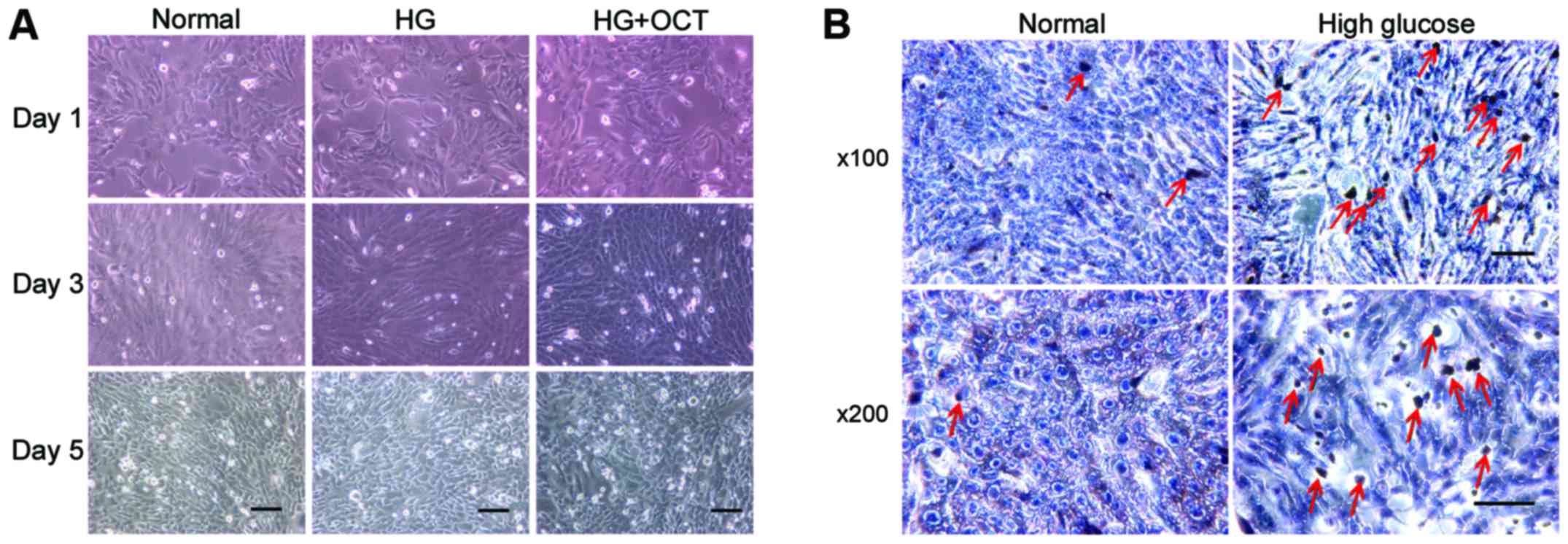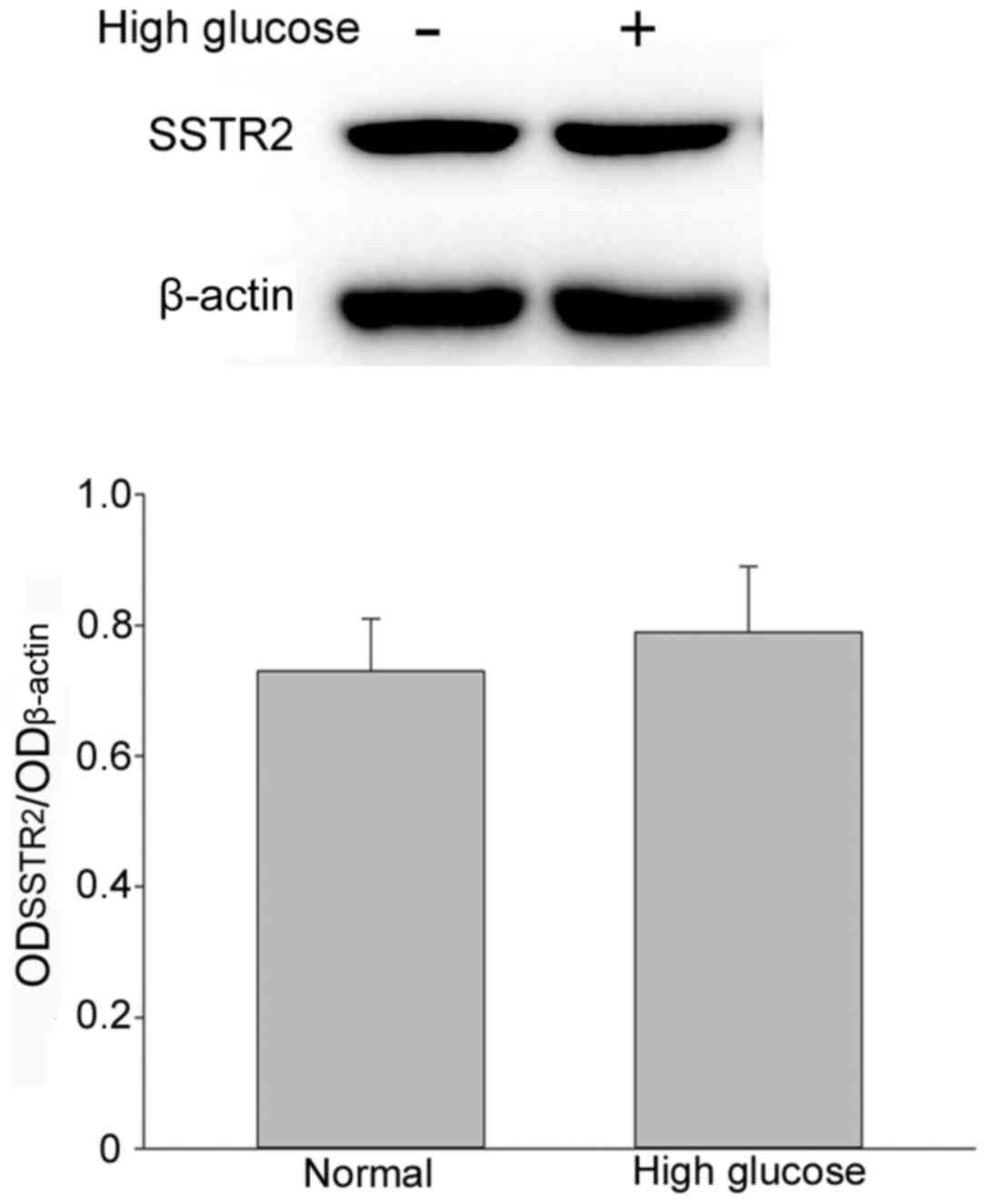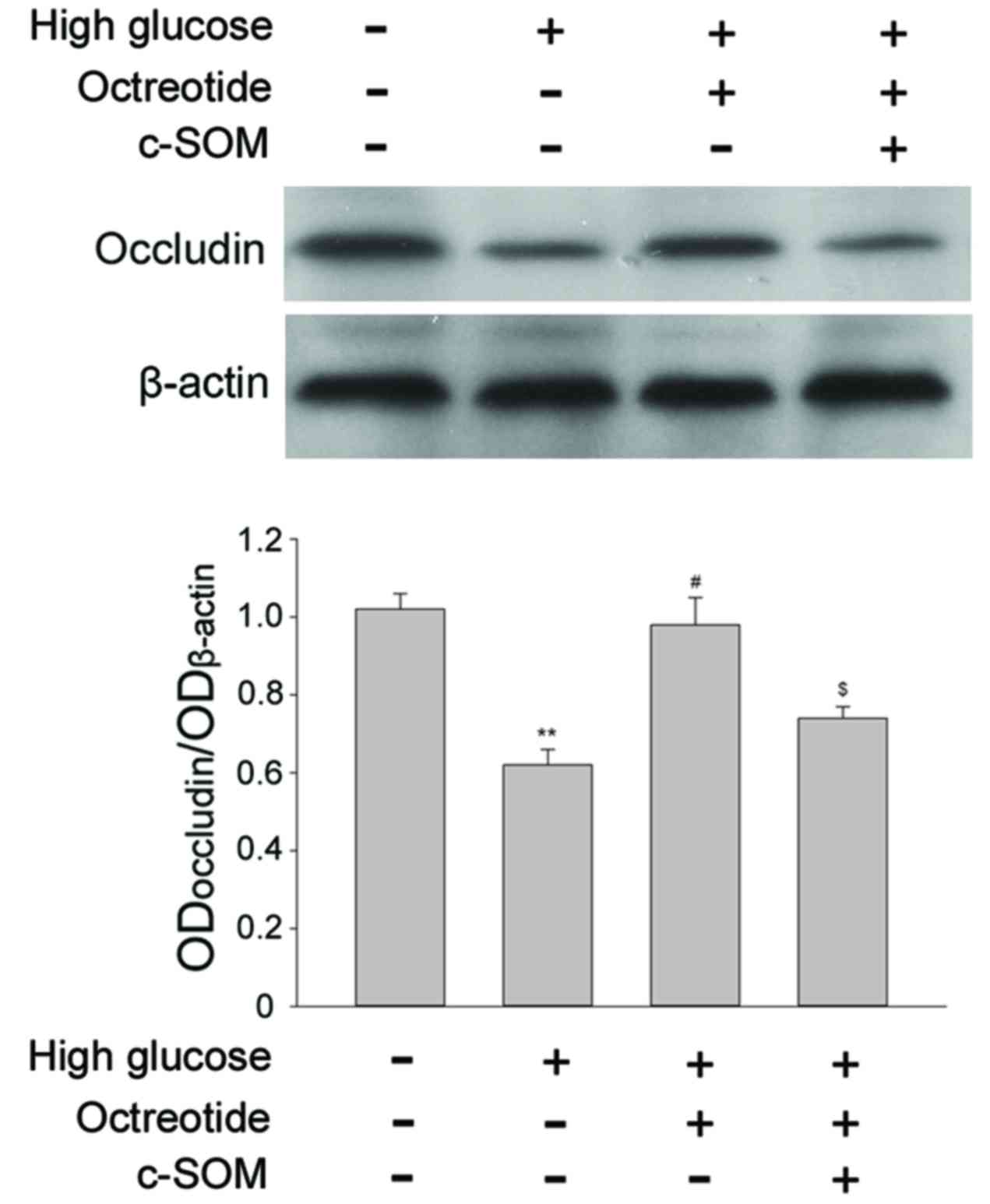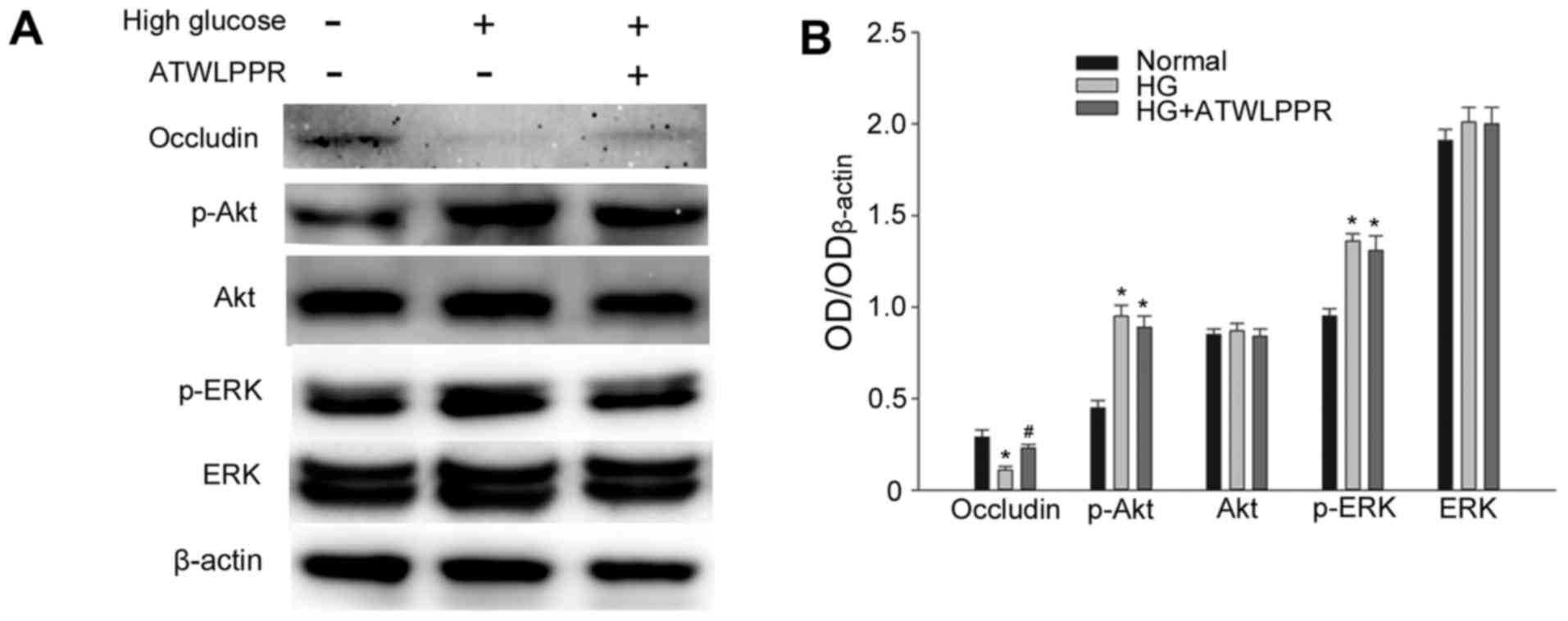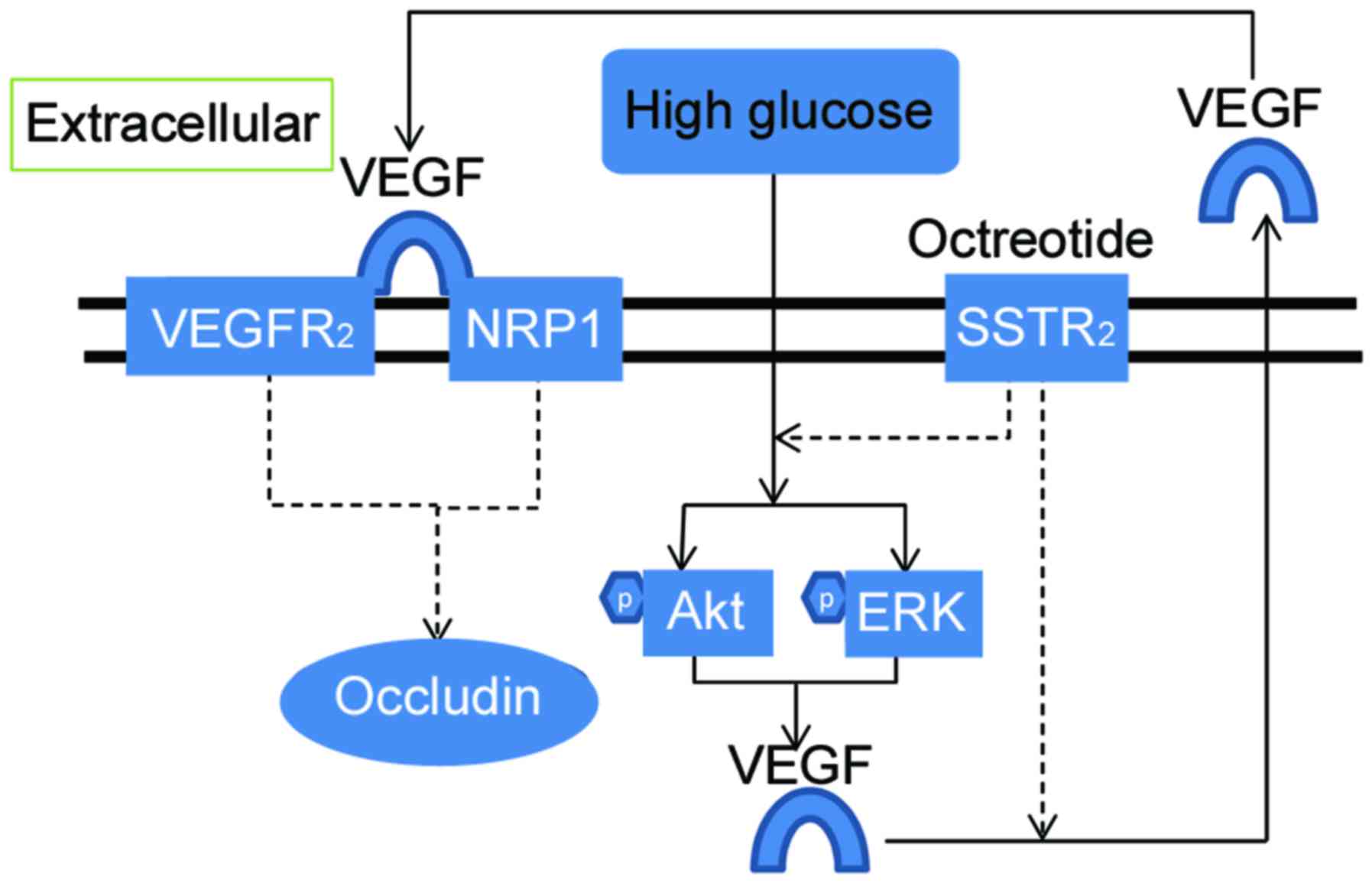|
1
|
Ciulla TA, Amador AG and Zinman B:
Diabetic retinopathy and diabetic macular edema: Pathophysiology,
screening, and novel therapies. Diabetes Care. 26:2653–2664. 2003.
View Article : Google Scholar : PubMed/NCBI
|
|
2
|
Klein R, Klein BE, Moss SE and
Cruickshanks KJ: The wisconsin epidemiologic study of diabetic
retinopathy: XVII. The 14-year incidence and progression of
diabetic retinopathy and associated risk factors in type 1
diabetes. Ophthalmology. 105:1801–1815. 1998. View Article : Google Scholar : PubMed/NCBI
|
|
3
|
Zhang C, Wang H, Nie J and Wang F:
Protective factors in diabetic retinopathy: Focus on blood-retinal
barrier. Discov Med. 18:105–112. 2014.PubMed/NCBI
|
|
4
|
Hernández C, García-Ramírez M, Corraliza
L, Fernández-Carneado J, Farrera-Sinfreu J, Ponsati B,
González-Rodríguez A, Valverde AM and Simó R: Topical
administration of somatostatin prevents retinal neurodegeneration
in experimental diabetes. Diabetes. 62:2569–2578. 2013. View Article : Google Scholar : PubMed/NCBI
|
|
5
|
Wang J, Sun Z, Shen J, Wu D, Liu F, Yang
R, Ji S, Ji A and Li Y: Octreotide protects the mouse retina
against ischemic reperfusion injury through regulation of
antioxidation and activation of NF-κB. Oxid Med Cell Longev.
2015:9701562015. View Article : Google Scholar : PubMed/NCBI
|
|
6
|
Hernández C, Simó-Servat O and Simó R:
Somatostatin and diabetic retinopathy: Current concepts and new
therapeutic perspectives. Endocrine. 46:209–214. 2014. View Article : Google Scholar : PubMed/NCBI
|
|
7
|
Cervia D, Casini G and Bagnoli P:
Physiology and pathology of somatostatin in the mammalian retina: A
current view. Mol Cell Endocrinol. 286:112–122. 2008. View Article : Google Scholar : PubMed/NCBI
|
|
8
|
Cristiani R, Petrucci C, Dal Monte M and
Bagnoli P: Somatostatin (SRIF) and SRIF receptors in the mouse
retina. Brain Res. 936:1–14. 2002. View Article : Google Scholar : PubMed/NCBI
|
|
9
|
Cervia D, Catalani E, Dal Monte M and
Casini G: Vascular endothelial growth factor in the ischemic retina
and its regulation by somatostatin. J Neurochem. 120:818–829. 2012.
View Article : Google Scholar : PubMed/NCBI
|
|
10
|
Mei S, Cammalleri M, Azara D, Casini G,
Bagnoli P and Dal Monte M: Mechanisms underlying somatostatin
receptor 2 down-regulation of vascular endothelial growth factor
expression in response to hypoxia in mouse retinal explants. J
Pathol. 226:519–533. 2012. View Article : Google Scholar : PubMed/NCBI
|
|
11
|
Deissler HL, Lang GK and Lang GE: Capacity
of aflibercept to counteract VEGF-stimulated abnormal behavior of
retinal microvascular endothelial cells. Exp Eye Res. 122:20–31.
2014. View Article : Google Scholar : PubMed/NCBI
|
|
12
|
Gelfand MV, Hagan N, Tata A, Oh WJ,
Lacoste B, Kang KT, Kopycinska J, Bischoff J, Wang JH and Gu C:
Neuropilin-1 functions as a VEGFR2 co-receptor to guide
developmental angiogenesis independent of ligand binding. Elife.
3:e037202014. View Article : Google Scholar : PubMed/NCBI
|
|
13
|
Herzog B, Pellet-Many C, Britton G,
Hartzoulakis B and Zachary IC: VEGF binding to NRP1 is essential
for VEGF stimulation of endothelial cell migration, complex
formation between NRP1 and VEGFR2, and signaling via FAK Tyr407
phosphorylation. Mol Biol Cell. 22:2766–2776. 2011. View Article : Google Scholar : PubMed/NCBI
|
|
14
|
Celiker U, Ilhan N, Ozercan I, Demir T and
Celiker H: Octreotide reduces ischaemia-reperfusion injury in the
retina. Acta Ophthalmol Scand. 80:395–400. 2002. View Article : Google Scholar : PubMed/NCBI
|
|
15
|
Rauca C, Schäfer K and Höllt V: Effects of
somatostatin, octreotide and cortistatin on ischaemic neuronal
damage following permanent middle cerebral artery occlusion in the
rat. Naunyn Schmiedebergs Arch Pharmacol. 360:633–638. 1999.
View Article : Google Scholar : PubMed/NCBI
|
|
16
|
Chen L, Wang L, Zhang X, Cui L, Xing Y,
Dong L, Liu Z, Li Y, Zhang X, Wang C, et al: The protection by
octreotide against experimental ischemic stroke: Up-regulated
transcription factor Nrf2, HO-1 and down-regulated NF-κB
expression. Brain Res. 1475:80–87. 2012. View Article : Google Scholar : PubMed/NCBI
|
|
17
|
Rojas M, Zhang W, Xu Z, Lemtalsi T,
Chandler P, Toque HA, Caldwell RW and Caldwell RB: Requirement of
NOX2 expression in both retina and bone marrow for diabetes-induced
retinal vascular injury. PLoS One. 8:e843572013. View Article : Google Scholar : PubMed/NCBI
|
|
18
|
Moran E, Ding L, Wang Z, Cheng R, Chen Q,
Moore R, Takahashi Y and Ma JX: Protective and antioxidant effects
of PPARα in the ischemic retina. Invest Ophthalmol Vis Sci.
55:4568–4576. 2014. View Article : Google Scholar : PubMed/NCBI
|
|
19
|
Cervia D and Casini G: The neuropeptide
systems and their potential role in the treatment of mammalian
retinal ischemia: A developing story. Curr Neuropharmacol.
11:95–101. 2013. View Article : Google Scholar : PubMed/NCBI
|
|
20
|
Dal Monte M, Ristori C, Videau C, Loudes
C, Martini D, Casini G, Epelbaum J and Bagnoli P: Expression,
localization, and functional coupling of the somatostatin receptor
subtype 2 in a mouse model of oxygen-induced retinopathy. Invest
Ophthalmol Vis Sci. 51:1848–1856. 2010. View Article : Google Scholar : PubMed/NCBI
|
|
21
|
Adams RL, Adams IP, Lindow SW, Zhong W and
Atkin SL: Somatostatin receptors 2 and 5 are preferentially
expressed in proliferating endothelium. Br J Cancer. 92:1493–1498.
2005. View Article : Google Scholar : PubMed/NCBI
|
|
22
|
Spoerri PE, Afzal A, Li Calzi S, Shaw LC,
Cai J, Pan H, Boulton M and Grant MB: Effects of VEGFR-1, VEGFR-2,
and IGF-IR hammerhead ribozymes on glucose-mediated tight junction
expression in cultured human retinal endothelial cells. Mol Vis.
12:32–42. 2006.PubMed/NCBI
|
|
23
|
Muthusamy A, Lin CM, Shanmugam S, Lindner
HM, Abcouwer SF and Antonetti DA: Ischemia-reperfusion injury
induces occludin phosphorylation/ubiquitination and retinal
vascular permeability in a VEGFR-2-dependent manner. J Cereb Blood
Flow Metab. 34:522–531. 2014. View Article : Google Scholar : PubMed/NCBI
|
|
24
|
Harhaj NS, Felinski EA, Wolpert EB,
Sundstrom JM, Gardner TW and Antonetti DA: VEGF activation of
protein kinase C stimulates occludin phosphorylation and
contributes to endothelial permeability. Invest Ophthalmol Vis Sci.
47:5106–5115. 2006. View Article : Google Scholar : PubMed/NCBI
|
|
25
|
Li X, Wang Q, Xu H, Tao L, Lu J, Cai L and
Wang C: Somatostatin regulates tight junction proteins expression
in colitis mice. Int J Clin Exp Pathol. 7:2153–2162.
2014.PubMed/NCBI
|
|
26
|
Zhao B, Cai J and Boulton M: Expression of
placenta growth factor is regulated by both VEGF and hyperglycaemia
via VEGFR-2. Microvasc Res. 68:239–246. 2004. View Article : Google Scholar : PubMed/NCBI
|
|
27
|
Aiello LP, Bursell SE, Clermont A, Duh E,
Ishii H, Takagi C, Mori F, Ciulla TA, Ways K, Jirousek M, et al:
Vascular endothelial growth factor-induced retinal permeability is
mediated by protein kinase C in vivo and suppressed by an orally
effective beta-isoform-selective inhibitor. Diabetes. 46:1473–1480.
1997. View Article : Google Scholar : PubMed/NCBI
|
|
28
|
Amin RH, Frank RN, Kennedy A, Eliott D,
Puklin JE and Abrams GW: Vascular endothelial growth factor is
present in glial cells of the retina and optic nerve of human
subjects with nonproliferative diabetic retinopathy. Invest
Ophthalmol Vis Sci. 38:36–47. 1997.PubMed/NCBI
|
|
29
|
Behzadian MA, Windsor LJ, Ghaly N, Liou G,
Tsai NT and Caldwell RB: VEGF-induced paracellular permeability in
cultured endothelial cells involves urokinase and its receptor.
FASEB J. 17:752–754. 2003.PubMed/NCBI
|
|
30
|
Qaum T, Xu Q, Joussen AM, Clemens MW, Qin
W, Miyamoto K, Hassessian H, Wiegand SJ, Rudge J, Yancopoulos GD
and Adamis AP: VEGF-initiated blood-retinal barrier breakdown in
early diabetes. Invest Ophthalmol Vis Sci. 42:2408–2413.
2001.PubMed/NCBI
|
|
31
|
Wu HM, Yuan Y, Zawieja DC, Tinsley J and
Granger HJ: Role of phospholipase C protein kinase C, and calcium
in VEGF-induced venular hyperpermeability. Am J Physiol.
276:H535–H542. 1999.PubMed/NCBI
|
|
32
|
Joussen IS, Poulaki V, Tsujikawa A, Qin W,
Qaum T, Xu Q, Moromizato Y, Bursell SE, Wiegand SJ, Rudge J, et al:
Suppression of diabetic retinopathy with angiopoietin-1. Am J
Pathol. 160:1683–1693. 2002. View Article : Google Scholar : PubMed/NCBI
|
|
33
|
Dal Monte M, Ristori C, Cammalleri M and
Bagnoli P: Effects of somatostatin analogues on retinal
angiogenesis in a mouse model of oxygen-induced retinopathy:
Involvement of the somatostatin receptor subtype 2. Invest
Ophthalmol Vis Sci. 50:3596–3606. 2009. View Article : Google Scholar : PubMed/NCBI
|
|
34
|
Imaizumi T, Itaya H, Nasu S, Yoshida H,
Matsubara Y, Fujimoto K, Matsumiya T, Kimura H and Satoh K:
Expression of vascular endothelial growth factor in human umbilical
vein endothelial cells stimulated with interleukin-1alpha-an
autocrine regulation of angiogenesis and inflammatory reactions.
Thromb Haemost. 83:949–955. 2000.PubMed/NCBI
|
|
35
|
Simorre-Pinatel V, Guerrin M, Chollet P,
Penary M, Clamens S, Malecaze F and Plouet J: Vasculotropin-VEGF
stimulates retinal capillary endothelial cells through an autocrine
pathway. Invest Ophthalmol Vis Sci. 35:3393–3400. 1994.PubMed/NCBI
|
|
36
|
Lee MJ, Thangada S, Claffey KP, Ancellin
N, Liu CH, Kluk M, Volpi M, Sha'afi RI and Hla T: Vascular
endothelial cell adherens junction assembly and morphogenesis
induced by sphingosine-1-phosphate. Cell. 99:301–312. 1999.
View Article : Google Scholar : PubMed/NCBI
|
|
37
|
Amin MA, Volpert OV, Woods JM, Kumar P,
Harlow LA and Koch AE: Migration inhibitory factor mediates
angiogenesis via mitogen-activated protein kinase and
phosphatidylinositol kinase. Circ Res. 93:321–329. 2003. View Article : Google Scholar : PubMed/NCBI
|
|
38
|
Nacci C, Tarquinio M and Montagnani M:
Molecular and clinical aspects of endothelial dysfunction in
diabetes. Intern Emerg Med. 4:107–116. 2009. View Article : Google Scholar : PubMed/NCBI
|
|
39
|
Breslin JW, Pappas PJ, Cerveira JJ, Hobson
RW II and Durán WN: VEGF increases endothelial permeability by
separate signaling pathways involving ERK-1/2 and nitric oxide. Am
J Physiol Heart Circ Physiol. 284:H92–H100. 2003. View Article : Google Scholar : PubMed/NCBI
|
|
40
|
Becker PM, Waltenberger J, Yachechko R,
Mirzapoiazova T, Sham JS, Lee CG, Elias JA and Verin AD:
Neuropilin-1 regulates vascular endothelial growth factor-mediated
endothelial permeability. Circ Res. 96:1257–1265. 2005. View Article : Google Scholar : PubMed/NCBI
|
|
41
|
Ackah E, Yu J, Zoellner S, Iwakiri Y,
Skurk C, Shibata R, Ouchi N, Easton RM, Galasso G, Birnbaum MJ, et
al: Akt1/protein kinase Balpha is critical for ischemic and
VEGF-mediated angiogenesis. J Clin Invest. 115:2119–2127. 2005.
View Article : Google Scholar : PubMed/NCBI
|
|
42
|
Bullard LE, Qi X and Penn JS: Role for
extracellular signal-responsive kinase-1 and −2 in retinal
angiogenesis. Invest Ophthalmol Vis Sci. 44:1722–1731. 2003.
View Article : Google Scholar : PubMed/NCBI
|
|
43
|
Jin J, Yuan F, Shen MQ, Feng YF and He QL:
Vascular endothelial growth factor regulates primate
choroid-retinal endothelial cell proliferation and tube formation
through PI3K/Akt and MEK/ERK dependent signaling. Mol Cell Biochem.
381:267–272. 2013. View Article : Google Scholar : PubMed/NCBI
|
|
44
|
Evans IM, Yamaji M, Britton G, Pellet-Many
C, Lockie C, Zachary IC and Frankel P: Neuropilin-1 signaling
through p130Cas tyrosine phosphorylation is essential for growth
factor-dependent migration of glioma and endothelial cells. Mol
Cell Biol. 31:1174–1185. 2011. View Article : Google Scholar : PubMed/NCBI
|















